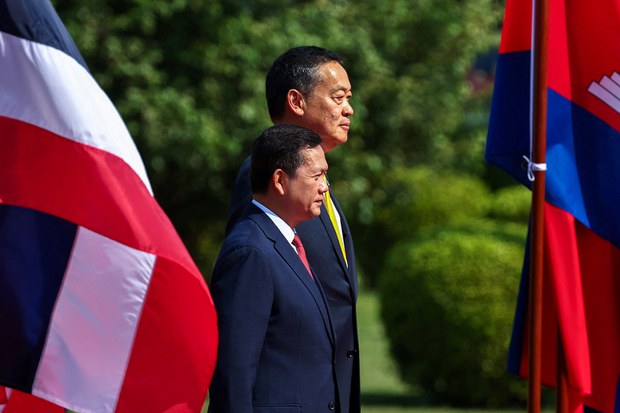Hun Manet warns Thailand following confrontation at disputed ancient temple
2025.03.17
 Cambodian Prime Minister Hun Manet reviews an honor guard with Thailand’s Prime Minister Srettha Thavisin in Bangkok, Feb. 7, 2024.
Cambodian Prime Minister Hun Manet reviews an honor guard with Thailand’s Prime Minister Srettha Thavisin in Bangkok, Feb. 7, 2024.
Prime Minister Hun Manet threatened to use military force if the Thai military sends soldiers to a disputed ancient Khmer temple on the Thai-Cambodia border.
The incomplete boundary demarcation at the Ta Moan Thom temple led to a confrontation between Cambodian soldiers who visited the temple last month and Thai soldiers who are stationed nearby, according to independent online news outlet CamboJa.
The Thai military wrote a formal protest letter to the Cambodian Army following the confrontation, Thai defense minister told reporters on Feb. 17.
On Monday, Hun Manet said Cambodia wouldn’t be afraid to fight back if the Thai military violates Cambodian sovereignty.
“As a government, our priority is to adhere to peaceful resolution, using the basis of law and negotiation and our diplomacy, international law,” he said in a speech to the Cambodian Tycoon Association.
“But we will be ready at all times if there is the use of armed force to invade Cambodian territory,” he said. “Cambodia reserves the right to defend its sovereignty, using all means, including armed force.”
The Ta Moan Thom dispute has similarities to the decades-long disagreement over Preah Vihear temple, which was the site of deadly border clashes with Thailand between 2008 and 2011.
Ta Moan Thom is located in the border area between Cambodia’s Oddar Meanchey province and Thailand’s Surin province and is about 140 km (87 miles) west of Preah Vihear temple.
Preah Vihear temple, located atop a cliff in the Dangrek Mountains, was awarded to Cambodia in 1962 by the International Court of Justice (ICJ). But that decision didn’t take into account the 4.6 square kilometer (1.8 square mile) area around the 1,000-year-old Hindu temple.
Cambodian and Thai troops exchanged several rounds of fire beginning in 2008 after Preah Vihear was designated a UNESCO World Heritage Site. That dispute dissipated after the ICJ again ruled in Cambodia’s favor in 2011.
Hun Manet mentioned that case on Monday, saying that Cambodia has experience in filing complaints to the ICJ and in fighting to defend its territory.
Hun Sen and the ICC
Meanwhile, Senate President Hun Sen threatened to arrest anyone who compares him to former Philippine President Rodrigo Duterte, who was arrested this week and sent to the Netherlands where he’ll face trial before the International Criminal Court (ICC), for his bloody “war on drugs.”
Speaking at the same conference in Phnom Penh, Hun Sen said people shouldn’t compare him to dictators or any other national leaders who face international arrest warrants over alleged crimes against humanity.
“I don’t interfere in the Philippines’ internal affairs, but for Cambodia, we have strongly announced that we don’t send our people to other countries for prosecution,” he said. “Our Constitution prohibits us from stripping citizenships and prohibits the arrest of people on behalf of foreign countries.”
RELATED STORIES
Cambodian leader to discuss border issues, trade on first Thailand visit as PM
Hun Sen’s legacy: Cambodia as the family business
A son inherits power in Cambodia: The making of Hun Manet
Hun Sen’s autocratic rule as prime minister included complaints filed to the ICC by opposition activists and international lawyers over the 2016 shooting death of government critic Kem Ley, the 2017 dissolution of the opposition Cambodia National Rescue Party and various land disputes prompted by mass evictions.
Hun Sen, 72, resigned as prime minister in 2023 in favor of his eldest son, Hun Manet.
Hun Sen’s track record from decades in power makes it difficult to prevent people from comparing him to dictators, legal analyst Vorn Chanlout told RFA.
“He has persecuted people and politicians and innocents,” he said. “People can’t be banned from comparing him negatively. He would need to do good now for people to compare with good people.”
Cambodia ratified the Rome Statute of the International Criminal Court – the treaty that established the ICC – in 2002. The ratification gave the court jurisdiction over crimes committed on Cambodia’s territory or by its citizens.







